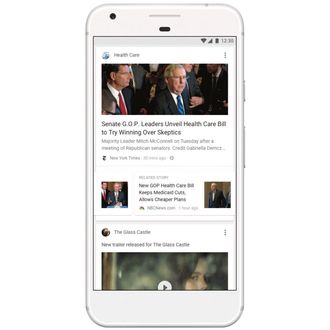
Imagine a convenient service that uses information harvested about every facet of your life to show you pertinent, up-to-date information. Presented in an endlessly scrolling list of images, text, and hyperlinks, the feed service aggregates and synthesizes your stated interests, constantly learning from your behavior to ensure it’s presenting you with the most engaging information. It’s owned by one of the biggest and most data-rich companies on the planet, and it’s an important component of an increasingly sophisticated data-harvesting operation designed to efficiently and effectively target advertising.
You’re imagining, right now, Facebook’s News Feed — the company’s most familiar, most famous, and most profitable product. But you’re also imagining a newly updated and expanded Google feature: information feeds, which will present themselves right at the front of Google’s mobile search app, right underneath the Google search field.
The feature isn’t quite as brand-new as Google’s PR push would indicate — for a while now, the Google app has shown “cards” it believes will be of interest to users (sports scores, schedules, travel times, etc.) on its main screen. The expanded product, however, is vastly more news-oriented, and uses “machine learning” and “artificial intelligence” and other buzzwords to divine and reflect your interests. Which means, basically, they’re going to show you stuff based on the stuff you search for using Google. Ostensibly, if you Google “fitness tips” a lot you’ll get a lot of exercise info, and if you want, you can explicitly tell the service to collect current information on set topics. It’s like setting a Google News alert (if you’ve ever done that; do people still do that?).
It’s not surprising that Google would be interested in creating its own feed product: The feed, as a format, is incredibly efficient at grabbing and holding users’ attention, the foundation of successful advertising companies like Google and Facebook. What sets Google’s feed product apart from the Facebook News Feed is that the latter hinges on a user’s social graph — their friends list — and what friends are sharing and liking and commenting on, while the former is built around the search interests of the user.
If Google’s feed has an advantage over Facebook’s, it’s just that — search behavior arguably better reflects what a user really wants to see than sharing behavior does. The Facebook News Feed reflects the face you want to show to your friends (political causes, funny videos, personal reminiscences), while the Google feed, hypothetically, will reflect your inner desires and queries (medical anxieties and porn preferences). A service that serves up what I’m looking for, rather than what I want my friends to think I’m looking for, could potentially be hugely valuable.
Or it could be just as muddled, biased, and uninteresting. It’s not just that search history provides as incomplete a picture of a person as a social graph does, it’s also that algorithmic ranking and prioritization aren’t necessarily the solution to creating content that people want. The answers that Wired did or didn’t receive on the issue are telling: “[T]o questions about whether Google’s creating yet another echo chamber on the internet, a place for people to find what they want to hear and nothing more, Google’s execs effectively said that’s an algorithm issue. They hope that the trending topics modules, along with the new fact-check and varying-viewpoint tools, can show people more than what they explicitly ask for.”
“They hope!” In other words, said execs have absolutely no clue how algorithmic tailoring won’t trap people in yet another filter bubble. The company promises a diverse array of sources, but what does that mean for users who inject biases into their search queries (e.g., “Did the Holocaust happen?”)? Just trust the machines, they’ll figure it out! We’ve heard that one many times before.
So why is Google doing this? Getting more people to open its app and use yet another one of its information vectors gives the company another opportunity to harvest more data about you and sell targeted ads against those interests. It wouldn’t be shocking if Google started putting ads on the front page of its mobile app sometime in the near future.





























